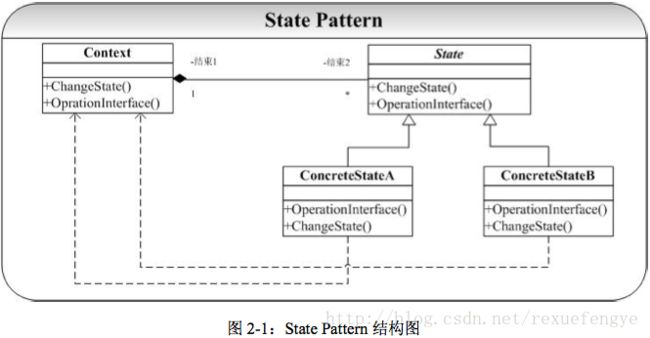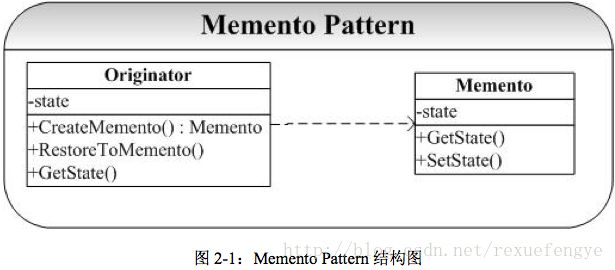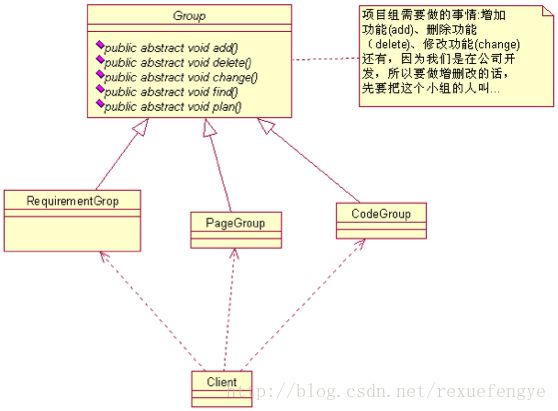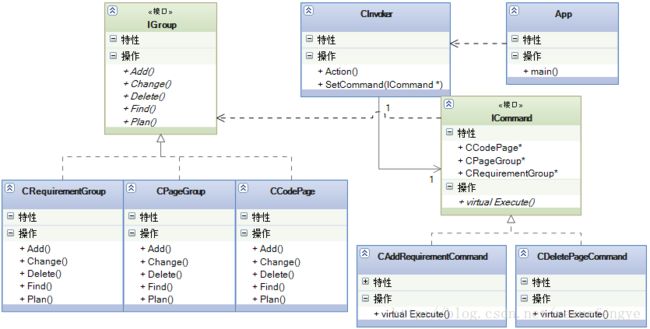状态模式
一、描述
概念:允许一个对象在其内部状态改变时改变它的行为。 对象看起来似乎修改了它的类。
问题:
每个人、事物在不同的状态下会有不同表现(动作),而一个状态又会在不同的表现下转移到下一个不同的状态(State)。 最简单的一个生活中的例子就是:
地铁入口处,如果你放入正确的地铁票,门就会打开让你通过。 在出口处也是验票,如果正确你就可以 ok,否则就不让你通过(如果你动作野蛮,或许会有报警(Alarm),:)。
有限状态自动机(FSM)也是一个典型的状态不同,对输入有不同的响应(状态转移)。 通常我们在实现这类系统会使用到很多的Switch/Case语句,Case某种状态,发生什么动作,Case 另外一种状态,则发生另外一种状态。 但是这种实现方式至少有以下两个问题:
1)当状态数目不是很多的时候,Switch/Case 可能可以搞定。 但是当状态数目很多的时候(实际系统中也正是如此),维护一大组的 Switch/Case 语句将是一件异常困难并且容易出错的事情。
2)状态逻辑和动作实现没有分离。 在很多的系统实现中,动作的实现代码直接写在状态的逻辑当中。 这带来的后果就是系统的扩展性和维护得不到保证。
模式选择
State 模式就是被用来解决上面列出的两个问题的,在 State 模式中我们将状态逻辑和动作实现进行分离。 当一个操作中要维护大量的 case 分支语句,并且这些分支依赖于对象的状态。 State 模式将每一个分支都封装到独立的类中。
State 模式典型的结构图为:
备忘录模式
一、描述:
没有人想犯错误,但是没有人能够不犯错误。犯了错误一般只能改过,却很难改正(恢复)。世界上没有后悔药,但是我们在进行软件系统的设计时候是要给用户后悔的权利(实际上可能也是用户要求的权利:),我们对一些关键性的操作肯定需要提供诸如撤销(Undo) 的操作。那这个后悔药就是 Memento 模式提供的。
Memento 模式的关键就是要在不破坏封装行的前提下,捕获并保存一个类的内部状态,这样就可以利用该保存的状态实施恢复操作。为了达到这个目标,可以在后面的实现中看到我们采取了一定语言支持的技术。
**Memento 模式的典型结构图为: **
二、实例
备忘录:Memento类
Memento.h
#ifndef __Memento__Memento__
#define __Memento__Memento__
#include
#include
using namespace std;
class Memento
{
public:
protected:
private:
//这是最关键的地方,将 Originator 为 friend 类,可以访问内部信息,但是其他类不能访问
friend class Originator; typedef string State;
Memento();
Memento(const State& sdt); ~Memento();
void SetState(const State& sdt); State GetState();
private:
State _sdt;
};
Memento.cpp
#include "Memento.h"
typedef string State;
Memento::Memento()
{
}
Memento::Memento(const State& sdt)
{
this->_sdt = sdt;
}
State Memento::GetState()
{
return this->_sdt;
}
void Memento::SetState(const State& sdt)
{
this->_sdt = sdt;
}
撤销返回操作:originator类
originator.h
#ifndef __Memento__Originator__
#define __Memento__Originator__
#include
#include
#include "Memento.h"
using namespace std;
class Originator
{
public:
typedef string State; Originator();
Originator(const State& sdt);
~Originator();
Memento* CreateMemento();
void SetMemento(Memento* men);
void RestoreToMemento(Memento* mt);
State GetState();
void SetState(const State& sdt);
void PrintState();
protected:
private:
State _sdt;
Memento* _mt;
};
Originator.cpp
#include "Originator.h"
typedef string State;
Originator::Originator()
{
this->_sdt = "";
this->_mt = 0;
}
Originator::Originator(const State& sdt)
{
this->_sdt = sdt;
this->_mt = 0;
}
Originator::~Originator()
{
}
Memento* Originator::CreateMemento()
{
return new Memento(_sdt);
}
State Originator::GetState()
{
return this->_sdt;
}
void Originator::SetState(const State& sdt)
{
this->_sdt = sdt;
}
void Originator::PrintState()
{
cout<_sdt<<"....."<
}
void Originator::SetMemento(Memento* men)
{
}
void Originator::RestoreToMemento(Memento* mt)
{
this->_sdt = mt->GetState();
}
主程序:main
main.cpp
#include
#include "Memento.h"
#include "Originator.h"
using namespace std;
int main(int argc, const char * argv[])
{
// insert code here...
Originator *myOriginator = new Originator();
myOriginator->SetState("备忘状态old");//备忘前状态
myOriginator->PrintState();
Memento *myMemento = myOriginator->CreateMemento();//将状态备忘
myOriginator->SetState("修改状态new");//修改状态
myOriginator->PrintState();
myOriginator->RestoreToMemento(myMemento);//恢复修改前状态
myOriginator->PrintState();
std::cout << "Hello, World!\n";
return 0;
}
Memento 模式的关键就是 friend class Originator;我们可以看到,Memento 的接口都声明为 private,而将 Originator 声明为 Memento 的友元类。 我们将 Originator 的状态保存在 Memento 类中,而将 Memento 接口 private 起来,也就达到了封装的功效。 在 Originator 类中我们提供了方法让用户后悔:RestoreToMemento(Memento* mt);我们可以 通过这个接口让用户后悔。 在测试程序中,我们演示了这一点:Originator 的状态由 old 变为 new 最 后又回到了 old。
命令模式
一、描述:
命令模式,将一个请求封装为一个对象,从而使你可用不同的请求对客户进行参数化;对请求排队或记录请求日志,以及支持可撤消的操作。应该是一个比较简单的模式了。
** Command 模式的典型结构图为: **
Command 模式结构图中,将请求的接收者(处理者)放到 Command 的具体子类ConcreteCommand 中,当请求到来时(Invoker 发出 Invoke 消息激活 Command 对象),ConcreteCommand 将处理请求交给 Receiver 对象进行处理。
二、实例:
描述:
今天讲命令模式,这个模式从名字上看就很简单,命令嘛,老大发命令,小兵执行就是了,确实是这个意思,但是更深化了,用模式来描述真是是世界的命令情况。 正在看这本书的你,我猜测分为两类:已经工作的和没有工作的,先说没有工作的,那你为啥要看这本书,为了以后工作呗,只要你参见工作,你肯定会待在项目组,那今天我们就以项目组为例子来讲述命令模式。
我是我们部门的项目经理,就是一个项目的头,在中国做项目,项目经理就是什么都要懂,什么都要管,做好了项目经理能分到一杯羹,做不好都是你项目经理的责任,这个是绝对的,我带过太多的项目,行政命令一压下来, 那就一条道,做完做好!我们虽然是一个集团公司,但是我们部门是独立核算的,就是说呀,我们部门不仅仅为我们集团服务,还可以为其他甲方服务,赚取更多的外快,所以俺们的工资才能是中上等。 在 2007 年我带领了一个项目,比较小,但是钱可不少,是做什么的呢?为一家旅行社建立一套内部管理系统,管理他的客户、旅游资源、票务以及内部管理,整体上类似一个小型的 ERP 系统,门店比较多,员工也比较多,但是需求比较明确, 因为他们之前有一套自己购买的内部管理系统,这次变动部分模块基本上是翻版,而且旅行社有自己的IT 部门,比较好相处,都是技术人员,没有交流鸿沟嘛。
这个项目的成员分工也是采用了常规的分工方式,分为需求组(Requirement Group,简称 RG)、美工组(Page Group,简称 PG)、代码组(我们内部还有一个比较优雅的名字:逻辑实现组, 这里使用大家经常称呼的名称吧,英文缩写叫 Code Group,简称 CG),总共加上我这个项目经理正好十个人,刚开始的时候客户(也就是旅行社,甲方)还是很乐意和我们每个组探讨,比如和需求组讨论需求,和美工讨论页面, 和代码组讨论实现,告诉他们修改这里,删除这里,增加这些等等,这是一种比较常见的甲乙方合作模式,甲方深入到乙方的项目开发中,我们把这个模式用类图表示一下:
但是问题来了,我们修改可以,但是每次都是叫一个组去,布置个任务,然后出计划,次次都这样,如果让你当甲方也就是客户,你烦不烦?而且这种方式很容易出错误呀,而且还真发生过,客户把美工叫过去了,要删除,可美工说需求是这么写的, 然后客户又命令需求组过去,一次次的折腾,客户也烦躁了,于是直接抓住我这个项目经理说:
“我不管你们内部怎么安排,你就给我找个接头人,我告诉他怎么做,删除页面了,增加功能了,你们内部 怎么处理, 我就告诉他我要干什么就成了...”我一听,好呀,这也正是我想要的,我项目组的兄弟们也已经受不了了,于是我改变了一下我的处理方式, 看看类图(类图稍微更改下名称):
注释:
main(),客户
Invoker,命令接收者,如项目经理
IGroup,执行者接口
CRequirementGroup,需要组
CPageGroup,美工组
CCodePage,代码组
ICommand,命令接口
CAddRequirementCommand,执行增加一项需求的命令( Execute函数,将调用CRequirementGroup的多个命令。 来组合执行用户发出的命令。 )
CDeletePageCommand,执行删除一个页面的命令
命令接收者:InvokerInvoker.h
#ifndef __Command__Invoker__
#define __Command__Invoker__
#include
#include "ICommand.h"
class CInvoker
{
public:
CInvoker(void);
~CInvoker(void);
void SetCommand(ICommand *pcommand);
void Action();
private:
ICommand *m_pCommand;
};
Invoker.cpp
#include "Invoker.h"
CInvoker::CInvoker(void)
{
}
CInvoker::~CInvoker(void)
{
}
void CInvoker::SetCommand( ICommand *pcommand )
{
this->m_pCommand = pcommand;
}
void CInvoker::Action()
{
this->m_pCommand->Execute();
}
命令接口:IComman类
ICommand.h
#ifndef Command_ICommand_h
#define Command_ICommand_h
#include "RequirementGroup.h"
#include "PageGroup.h"
#include "CodeGroup.h"
class ICommand {
public:
ICommand(void)
{
m_prg = new CRequirementGroup();
m_ppg = new CPageGroup();
m_pcg = new CCodeGroup();
}
virtual ~ICommand(void)
{
delete m_prg;
delete m_ppg;
delete m_pcg;
}
virtual void Execute() = 0;
protected:
CRequirementGroup *m_prg;
CPageGroup *m_ppg;
CCodeGroup *m_pcg;
};
执行增加一项需求的命令:CAddRequirementCommand类
CAddRequirementCommand.h
#ifndef __Command__AddRequirementCommand__
#define __Command__AddRequirementCommand__
#include
#include "ICommand.h"
class CAddRequirementCommand :public ICommand
{
public:
CAddRequirementCommand(void);
~CAddRequirementCommand(void);
void Execute();
};
AddRequirementCommand.cpp
#include "AddRequirementCommand.h"
CAddRequirementCommand::CAddRequirementCommand(void)
{
}
CAddRequirementCommand::~CAddRequirementCommand(void)
{
}
void CAddRequirementCommand::Execute()
{
//执行增另一项需求的命令
this->ICommand::m_prg->Find();
//增加一份需求
this->ICommand::m_prg->Add();
//给出计划
this->ICommand::m_prg->Plan();
}
执行删除一个页面的命令 :CDeletePageCommand类
CDeletePageCommand.h
#ifndef __Command__DeletePageCommand__
#define __Command__DeletePageCommand__
#include
#include "ICommand.h"
class CDeletePageCommand :
public ICommand
{
public:
CDeletePageCommand(void);
~CDeletePageCommand(void);
void Execute();
};
DeletePageCommand.cpp
**[cpp]** [view plain](http://blog.csdn.net/rexuefengye/article/details/13004205#) [copy](http://blog.csdn.net/rexuefengye/article/details/13004205#)
#include "DeletePageCommand.h"
CDeletePageCommand::CDeletePageCommand(void)
{
}
CDeletePageCommand::~CDeletePageCommand(void)
{
}
void CDeletePageCommand::Execute()
{
//执行增另一项需求的命令
this->ICommand::m_ppg->Find();
//增加一份需求
this->ICommand::m_ppg->Delete();
//给出计划
this->ICommand::m_ppg->Plan();
}
执行者接口:IGroup
IGroup.h
#ifndef Command_IGroup_h
#define Command_IGroup_h
class IGroup
{
public:
IGroup(void){}
virtual ~IGroup(void){}
virtual void Find() = 0;
virtual void Add() = 0;
virtual void Delete() = 0;
virtual void Change() = 0;
virtual void Plan() = 0;
};
需要组:CRequirementGroup类
CRequirementGroup.h
#ifndef __Command__RequirementGroup__
#define __Command__RequirementGroup__
#include
#include "IGroup.h"
class CRequirementGroup:public IGroup
{
public:
CRequirementGroup(void);
~CRequirementGroup(void);
void Find();
void Add();
void Delete();
void Change();
void Plan();
};
CRequirementGroup.cpp
#include "RequirementGroup.h"
using std::cout;
using std::endl;
CRequirementGroup::CRequirementGroup(void)
{
}
CRequirementGroup::~CRequirementGroup(void)
{
}
void CRequirementGroup::Find()
{
cout << "找到需求组..." << endl;
}
void CRequirementGroup::Add()
{
cout << "客户要求增加一项需求..." << endl;
}
void CRequirementGroup::Delete()
{
cout << "要求删除一项需求..." << endl;
}
void CRequirementGroup::Change()
{
cout << "客户要求修改一项需求..." << endl;
}
void CRequirementGroup::Plan()
{
cout << "客户要求需求变更计划..." << endl;
}
美工组:CPageGroup
CPageGroup.h
#ifndef __Command__CPageGroup__
#define __Command__CPageGroup__
#include
#include "IGroup.h"
class CPageGroup :public IGroup
{
public:
CPageGroup(void);
~CPageGroup(void);
void Find();
void Add();
void Delete();
void Change();
void Plan();
};
CPageGroup.cpp
#include "PageGroup.h"
using std::cout;
using std::endl;
CPageGroup::CPageGroup(void)
{
}
CPageGroup::~CPageGroup(void)
{
}
void CPageGroup::Find()
{
cout << "找到美工组..." << endl;
}
void CPageGroup::Add()
{
cout << "客户要求增加一个页面..." << endl;
}
void CPageGroup::Delete()
{
cout << "客户要求删除一个页面..." << endl;
}
void CPageGroup::Change()
{
cout << "客户要求修改一个页面..." << endl;
}
void CPageGroup::Plan()
{
cout << "客户要求页面变更计划..." << endl;
}
代码组:CCodePage
CCodePage.h
#ifndef __Command__CodeGroup__
#define __Command__CodeGroup__
#include
#include "IGroup.h"
class CCodeGroup :public IGroup
{
public:
CCodeGroup(void);
~CCodeGroup(void);
void Find();
void Add();
void Delete();
void Change();
void Plan();
};
CCodePage.cpp
#include "CodeGroup.h"
using std::cout;
using std::endl;
CCodeGroup::CCodeGroup(void)
{
}
CCodeGroup::~CCodeGroup(void)
{
}
void CCodeGroup::Find()
{
cout << "找到代码组..." << endl;
}
void CCodeGroup::Add()
{
cout << "客户要求增加一项功能..." << endl;
}
void CCodeGroup::Delete()
{
cout << "客户要求删除一项功能..." << endl;
}
void CCodeGroup::Change()
{
cout << "客户要求修改一项功能..." << endl;
}
void CCodeGroup::Plan()
{
cout << "客户要求代码变更计划..." << endl;
}
客户 :main
main.cpp
#include
#include "IGroup.h"
#include "ICommand.h"
#include "RequirementGroup.h"
#include "PageGroup.h"
#include "CodeGroup.h"
#include "AddRequirementCommand.h"
#include "DeletePageCommand.h"
#include "Invoker.h"
using std::cout;
using std::endl;
void DoIt()
{
cout << "----------客户想增加一个需求----------" << endl;
IGroup *rg = new CRequirementGroup();
rg->Find();
rg->Add();
rg->Plan();
delete rg;
cout << endl;
cout << "----------客户又想修改一个页面----------" << endl;
IGroup *pg = new CPageGroup();
pg->Find();
pg->Add();
pg->Plan();
delete pg;
cout << endl;
cout << "----------客户又想删除一个功能----------" << endl;
IGroup *cg = new CCodeGroup();
cg->Find();
cg->Add();
cg->Plan();
delete cg;
cout << endl;
}
void DoNew()
{
cout << "----------客户觉得烦了,希望只找一个人,并告诉他要做什么----------" << endl;
cout << "----------客户要求增加一项需求----------" << endl;
CInvoker gary;
ICommand *pcommand = new CAddRequirementCommand();
gary.SetCommand(pcommand);
gary.Action();
delete pcommand;
cout << endl;
//客户想要改动只需要找CInvoker就可以了。
cout << "----------客户要求删除一个页面----------" << endl;
CInvoker ricky;
ICommand *pcommand2 = new CDeletePageCommand();
ricky.SetCommand(pcommand2);
ricky.Action();
delete pcommand2;
cout << endl;
}
int main(int argc, const char * argv[])
{
//客户原来的运行流程
cout<<"客户原来的运行流程"<
DoIt();
//客户觉得麻烦了,每次改动都要找不同的组,谈不同的事
//客户只想找一个人,告诉他要做什么就可以,不想关心由哪几个组来做和怎么做
cout<<"********************命令模式********************"<
DoNew();
// insert code here...
std::cout << "Hello, World!\n";
return 0;
}
结果如下:





